If I hear much more of the EU debate filtered through the prism of the rivalry between two old Etonian contemporaries, I shall scream! The slanging match between David Cameron and Boris Johnson ensures that this so-called debate will generate much heat and very little light. What’s more, both contenders have form when it comes to being economical, at best, with the truth.

Liar One
The art of the spin doctor is not new: it’s been around since at least the time of the ancient Greeks. Exaggeration, misleading emphasis and such have been in the armoury of politicians for a long time. Since 2010, David Cameron has taken this a stage further. I simply cannot remember a time when government ministers, led by the example of the prime minister, have told so many outright lies. Remember, the only career Cameron had before politics was in PR. There’s only one skill working in Public Relations teaches you. That’s the ability to lie convincingly. Putting aside party political differences, Cameron is in a league of his own as the prime minister whom, in my lifetime, I trust least to tell the truth.
The most notorious lie orchestrated by Cameron on taking power was that the 2007-8 economic crash was the fault of the Labour Party. The belief in that lie was the most important reason the Tories won the 2015 election. Of the many other lies, perhaps the most pernicious concern those which demonise the poor. The best example of this genre was the way the level of benefit fraud (actually 0.7% of benefits expenditure) was twisted in such a way that public opinion, on average, believed it to be 25%. The repeated assertions that debt reduction is Britain’s top economic priority and that austerity is the only solution are both lies: actually, they’re both matters of political choice.
And now I find myself on the same side of the fence as Cameron in the June EU referendum. We may be on the same side, but our reasons differ greatly. It’s an uncomfortable place to be. (Perhaps more on this some other time.)
Liar Two
Right up to the time of his carefully timed, much publicised and choreographed announcement that he was joining the “out” camp, Boris Johnson was yelling at all and sundry about how conflicted and agonized he was over the decision. And then – in a flash – he came out full throttle in favour of leaving the EU. That means one of two things. Either he lied when he said he was agonizing over the decision or he is insincere in his passion to leave. Either way, he lied.
A fascinating insight into Johnson’s character was revealed in a Guardian article in late February about the time in the 1990s when Johnson was the Daily Telegraph’s correspondent in Brussels. Over the years, a great many myths have circulated about the EU. Faceless bureaucrats were trying to over-regulate our lives: straight cucumbers, bans on using the word “chocolate” and so on. The myths could be entertaining, sometimes with a tiny grain of truth, but always grossly exaggerated or distorted. It turns out that a great many of the myths at this time came straight from the imagination and pen of… one Boris Johnson. He made them up for fun.
But much more seriously, the image of the EU as a killjoy, humourless and unelected bunch of over-zealous regulators who are tying us all up in red tape was nurtured in these years. This image helps the “outers” in their campaign. Johnson is now able to use the image he helped create to persuade British voters to opt to “leave”.
Other Voices Please!
So far, the debate in the media has been largely portrayed through the opposing (apparent) views of two rivals from privileged backgrounds. Both have an over-developed sense of their entitlement to power. The agenda is set by their respective wings of the Conservative Party. The only other voices to be heard so far are those media heroes and know-alls: business leaders. The experience of Donald Trump surely tells us that, just because you’re very rich or a business leader, does not mean you’re capable of having anything worth saying on the subject.
There are many other people and groups who deserve airtime during the oh-so-long period of debate. The opposition parties for a start. Academics, trades unions (who often fund useful research) and community groups have, so far, been given very little opportunity to join the discussion and, more importantly, set the agenda. One perennially under-represented group in the debate are Britain’s young people. As the referendum decision will have profound effects for years to come, it’s their future, above all, that’s at stake here.
So, starting with the BBC – which, as it says, belongs to all of us – let’s ensure our national debate gives a chance for people from all walks of life to have their say. It’s too important to be settled on the word-playing fields of Eton.